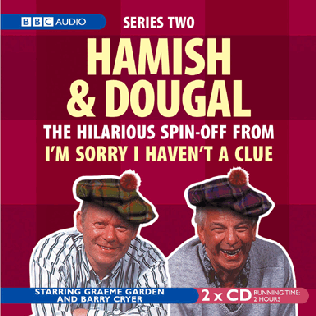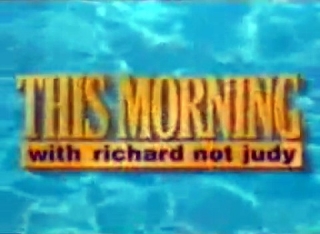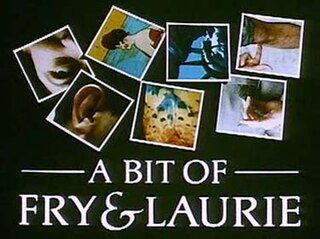
William Edgar Oddie is an English actor, artist, birder, comedian, conservationist, musician, songwriter, television presenter and writer. He was a member of comedy trio The Goodies.
I'm Sorry, I'll Read That Again was a BBC radio comedy programme that was developed from the 1964 Cambridge University Footlights revue, Cambridge Circus., as a scripted sketch show. It had a devoted youth following, with the live tapings enjoying very lively audiences, particularly when familiar themes and characters were repeated; a tradition that continued into the spinoff show I'm Sorry I Haven't a Clue.

I'm Sorry I Haven't a Clue is a BBC radio comedy panel game. Billed as "the antidote to panel games", it consists of two teams of two comedians being given "silly things to do" by a chairman. The show was launched in April 1972 as a parody of radio and TV panel games, and has been broadcast since on BBC Radio 4 and the BBC World Service, with repeats aired on BBC Radio 4 Extra and, in the 1980s and 1990s, on BBC Radio 2. The 50th series was broadcast in November and December 2007.

Timothy Julian Brooke-Taylor OBE was an English actor and comedian. He was best known as a member of The Goodies.

Geoffrey Howard Perkins was a British comedy producer, writer and performer. He was BBC head of comedy between 1995 and 2001, and produced the first two radio series of The Hitchhiker's Guide to the Galaxy. He is one of the people credited with creating the panel game Mornington Crescent for I'm Sorry I Haven't a Clue. In December 2008 he posthumously received an Outstanding Contribution to Comedy Award.
Week Ending was a satirical radio current affairs sketch show broadcast on BBC Radio 4 between 1970 and 1998. It was devised by writer-producers Simon Brett and David Hatch and was originally hosted by Nationwide presenter Michael Barratt.

Hamish and Dougal are two characters from the long-running BBC Radio 4 radio comedy panel game I'm Sorry I Haven't a Clue, played by Barry Cryer and Graeme Garden, who later went on to have their own Radio 4 series, You'll Have Had Your Tea: The Doings of Hamish and Dougal. The series is occasionally broadcast on the BBC's repeat station, Radio 4 Extra.
British humour carries a strong element of satire aimed at the absurdity of everyday life. Common themes include sarcasm, tongue-in-cheek, banter, insults, self-deprecation, taboo subjects, puns, innuendo, wit, and the British class system. These are often accompanied by a deadpan delivery which is present throughout the British sense of humour. It may be used to bury emotions in a way that seems unkind in the eyes of other cultures. Jokes are told about everything and almost no subject is off-limits, though a lack of subtlety when discussing controversial issues is sometimes considered insensitive. Many British comedy series have become successful internationally, serving as a representation of British culture to overseas audiences.

This Morning With Richard Not Judy or TMWRNJ is a BBC comedy television programme, written by and starring Lee and Herring. Two series were broadcast in 1998 and 1999 on BBC Two. The name was a satirical reference to ITV's This Morning which was at the time popularly referred to as This Morning with Richard and Judy.

Josephine Mary Kendall was a British actress and writer. She was known for her work on the BBC radio comedy show I'm Sorry, I'll Read That Again, which debuted in 1964, and for her role as Peggy Skilbeck on the ITV soap opera Emmerdale from 1972 to 1973, in which she also spoke the programme's first line of dialogue in the inaugural episode.
Twice a Fortnight is a 1967 British sketch comedy television series with Terry Jones, Michael Palin, Graeme Garden, Bill Oddie, Jonathan Lynn and Tony Buffery.

Victoria Wood: As Seen on TV is a British comedy sketch series written by and starring comedian Victoria Wood, with appearances from Julie Walters, Celia Imrie, Duncan Preston, Susie Blake and Patricia Routledge. The show was televised on BBC2 between 1985 and 1987 and included sketches that became famous in the United Kingdom.
The Cambridge Footlights Revue is an annual revue by the Footlights Club, a group of comedy writer-performers at the University of Cambridge. Three of the more notable revues are detailed below.

A Bit of Fry & Laurie is a British sketch comedy television series written by and starring former Cambridge Footlights members Stephen Fry and Hugh Laurie, broadcast on both BBC1 and BBC2 between 1989 and 1995. It ran for four series with 26 episodes, including a 36-minute pilot episode in 1987.
The Kevin Bishop Show is a sketch comedy written by and starring English comedian Kevin Bishop, part of the Star Stories team. The show was commissioned by Channel 4 for a six-part series starting on 25 July 2008 at 10 p.m. A pilot was broadcast on 23 November 2007 as part of Channel 4's Comedy Showcase and the programme soon earned interest for its incredibly fast pace; 42 sketches were shown in 23 minutes. The show was nominated for Best New Comedy at the 2008 British Comedy Awards. The show started its second series on Friday 31 July 2009 at 10 p.m. on Channel 4.

The Fast Show, also known as Brilliant in the United States, is a BBC comedy sketch show that ran on BBC 2 from 1994 to 1997, with specials in 2000 and 2014. The show's central performers were Paul Whitehouse, Charlie Higson, Simon Day, Mark Williams, John Thomson, Arabella Weir and Caroline Aherne. Other significant cast members included Felix Dexter, Paul Shearer, Rhys Thomas, Jeff Harding, Maria McErlane, Eryl Maynard, Colin McFarlane and Donna Ewin.
This is a list of events from British radio in 1965.
Bob Oliver Rogers was a radio producer employed by the British Broadcasting Corporation, between 1973 and 1979, at the BBC's New Broadcasting House, Manchester.